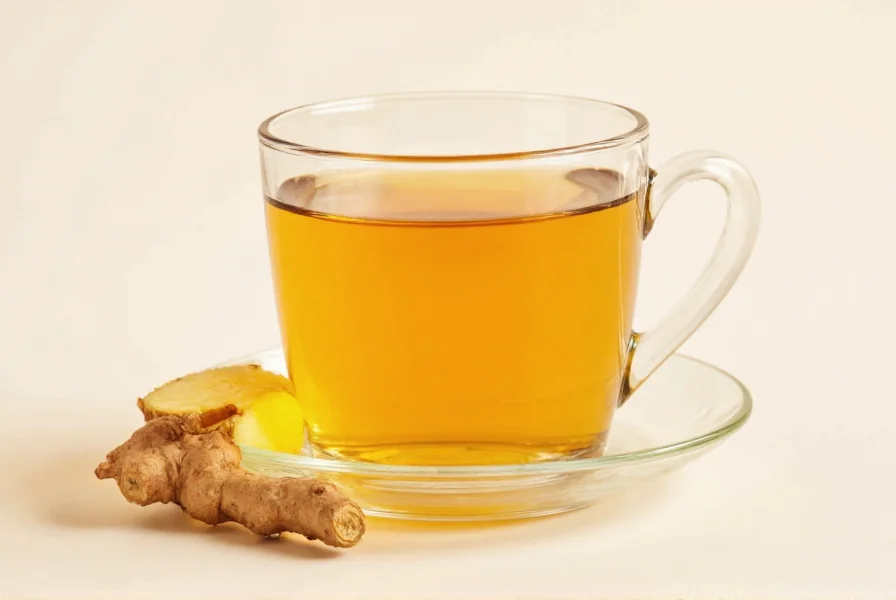For those struggling with occasional heartburn, ginger tea represents one of the most well-researched natural remedies. This ancient root has been used for centuries across various traditional medicine systems to address digestive discomfort. Modern science is now validating many of these traditional uses, particularly regarding ginger's effects on gastrointestinal function.
How Ginger Interacts with Acid Reflux
Ginger contains bioactive compounds called gingerols and shogaols that influence digestive processes in several beneficial ways. These compounds appear to strengthen the lower esophageal sphincter (LES), the muscular valve that prevents stomach contents from flowing back into the esophagus. When this valve functions properly, it significantly reduces reflux episodes.
Additionally, ginger promotes gastric motility—the rate at which your stomach empties its contents. Slower gastric emptying is a common contributor to acid reflux, as food remains in the stomach longer, increasing pressure that can force contents upward. By supporting more efficient digestion, ginger tea for acid reflux may help prevent this problematic backup.
Scientific Evidence on Ginger Tea and Acid Reflux
A 2007 study published in Molecular Research and Food Nutrition found that ginger root extract demonstrated significant anti-ulcer properties and protected the gastric mucosa. While this research focused on ulcers rather than reflux specifically, the protective mechanisms suggest potential benefits for those with acid-related conditions.
Another study in the Journal of Gastroenterology and Hepatology noted that ginger supplementation reduced symptoms of functional dyspepsia, a condition often associated with acid reflux. Participants experienced improved gastric emptying and reduced feelings of fullness and discomfort.
| Study | Findings Related to Digestion | Relevance to Acid Reflux |
|---|---|---|
| 2007 Molecular Research Study | Ginger extract protected gastric mucosa | Suggests potential protection against acid damage |
| 2011 Journal of Gastroenterology Study | Improved gastric emptying in dyspepsia patients | Addresses common reflux trigger |
| 2019 Review in Foods Journal | Anti-inflammatory effects on digestive tract | May reduce esophageal irritation from reflux |
Preparing Ginger Tea for Maximum Reflux Relief
Not all ginger teas deliver equal benefits for acid reflux sufferers. The preparation method significantly impacts the concentration of active compounds:
- Fresh ginger tea: Peel and slice 1-2 inches of fresh ginger root, simmer in 2 cups of water for 10-15 minutes. This method preserves more volatile compounds than pre-packaged teas.
- Timing matters: Drink ginger tea 20-30 minutes before meals to prepare your digestive system, or 1-2 hours after meals if experiencing symptoms.
- Concentration: For occasional relief, a standard strength tea suffices. During more persistent symptoms, a stronger brew (simmered longer with more ginger) may provide additional benefit.
Avoid adding honey or sugar to your ginger tea for acid reflux, as these can sometimes trigger symptoms in sensitive individuals. If the taste proves too strong, a small amount of aloe vera juice (known for its soothing properties) can be added instead.
When Ginger Tea Might Not Help (Or Could Worsen) Acid Reflux
While many find ginger tea beneficial for heartburn relief, it's not universally effective. Certain situations may reduce its effectiveness or even exacerbate symptoms:
- Severe esophagitis: When the esophagus is significantly inflamed, even mild irritants like ginger may cause discomfort
- GERD complications: For those with Barrett's esophagus or strictures, ginger tea for acid reflux may not address the underlying condition
- Individual sensitivity: Some people report ginger actually triggers their symptoms, possibly due to its mild spiciness
- Medication interactions: Ginger may interact with blood thinners and diabetes medications
If you experience increased burning or discomfort after drinking ginger tea, discontinue use. This reaction suggests your particular digestive system may be sensitive to ginger's compounds.
Ginger Tea Compared to Other Natural Remedies
Among natural approaches for acid reflux relief, ginger tea stands out for its research-backed benefits, but it's worth understanding how it compares to other popular options:
- Aloe vera juice: Soothes irritated tissue but doesn't address the underlying motility issues that ginger targets
- Slippery elm: Forms a protective coating but lacks ginger's active compounds that improve gastric function
- Apple cider vinegar: Works for some by increasing stomach acid, but can worsen symptoms in others—unlike ginger which generally has fewer adverse reactions
For best results with natural remedies for acid reflux with ginger, consider combining ginger tea with lifestyle modifications like elevating the head of your bed, avoiding late meals, and identifying personal trigger foods.
When to Consult a Healthcare Professional
Natural remedies like ginger tea work well for occasional, mild acid reflux. However, certain symptoms indicate you should seek medical advice rather than relying solely on home treatments:
- Heartburn occurring more than twice weekly
- Difficulty swallowing or painful swallowing
- Unintentional weight loss
- Nighttime symptoms that disrupt sleep
- Symptoms persisting despite consistent use of natural remedies
Chronic acid reflux (GERD) requires proper medical evaluation to prevent complications like esophageal damage. While ginger tea for heartburn relief can be part of your management strategy, it shouldn't replace professional medical care when needed.
Practical Tips for Using Ginger Tea Effectively
Based on clinical research and patient reports, these evidence-based strategies maximize ginger tea's potential benefits for acid reflux:
- Start with small amounts (½ cup) to assess tolerance before increasing
- Use fresh ginger rather than powdered for higher concentrations of active compounds
- Avoid drinking ginger tea on an empty stomach if you're sensitive
- Combine with chamomile tea for enhanced soothing effects
- Track your symptoms to determine if ginger tea helps your specific case
Remember that individual responses vary significantly when using natural remedies for acid reflux. What works well for one person might not provide the same relief for another, which is why tracking your personal response is crucial.

Conclusion: Ginger Tea as Part of a Comprehensive Approach
Ginger tea represents a promising natural option for managing mild acid reflux symptoms, supported by both traditional use and emerging scientific evidence. Its ability to improve gastric motility and reduce inflammation addresses key factors in reflux development. However, it works best as part of a comprehensive approach that includes dietary modifications, stress management, and proper meal timing.
For those seeking does ginger tea help with acid reflux information, the evidence suggests it can be beneficial for many—but not all—individuals. As with any natural remedy, personal experimentation combined with professional medical guidance yields the best outcomes for managing acid reflux symptoms effectively and safely.

Does ginger tea help with acid reflux immediately?
Ginger tea may provide some relief within 20-30 minutes for mild symptoms, but it's not an instant remedy like antacids. Its effects build over time as it supports healthy digestion. For immediate relief during severe episodes, ginger tea might not work quickly enough, and other approaches may be necessary.
How much ginger tea should I drink for acid reflux?
Start with ½ to 1 cup of fresh ginger tea 20-30 minutes before meals or 1-2 hours after meals when experiencing symptoms. Most studies suggest 1-2 grams of ginger daily is safe and effective. Don't exceed 4 grams daily without consulting a healthcare provider, as higher amounts might cause digestive upset in some people.
Can ginger tea make acid reflux worse?
Yes, for some individuals, ginger tea might worsen acid reflux symptoms. Those with severe esophagitis or particular sensitivity to ginger's compounds may experience increased burning. If you notice symptoms worsening after drinking ginger tea, discontinue use. This reaction occurs in a minority of cases but is important to recognize.
Is fresh ginger tea better than packaged ginger tea for acid reflux?
Fresh ginger tea generally contains higher concentrations of active compounds like gingerols compared to many pre-packaged teas. When preparing ginger tea for acid reflux, using fresh ginger root (simmered for 10-15 minutes) typically delivers more therapeutic benefits than tea bags, which may contain lower-quality or older ginger with diminished potency.
How long does it take for ginger tea to work for acid reflux?
Many people notice improvement in mild acid reflux symptoms within 20-30 minutes of drinking ginger tea. For more consistent results, regular consumption over 2-4 weeks may be necessary as ginger's digestive benefits build over time. It's not a cure for chronic GERD but can be part of an effective management strategy for occasional symptoms.











 浙公网安备
33010002000092号
浙公网安备
33010002000092号 浙B2-20120091-4
浙B2-20120091-4